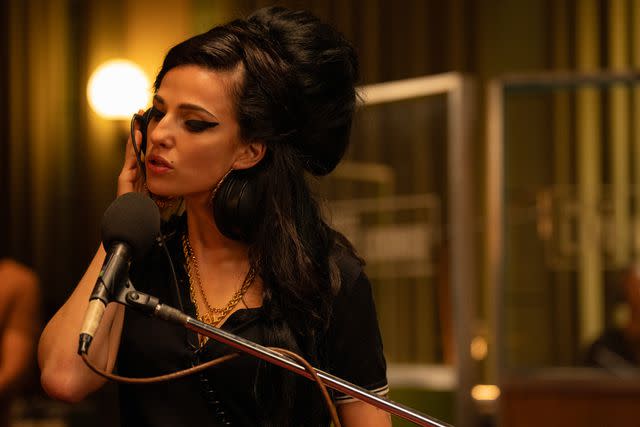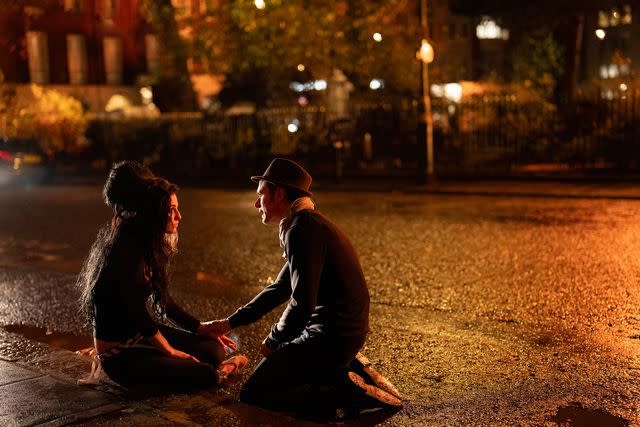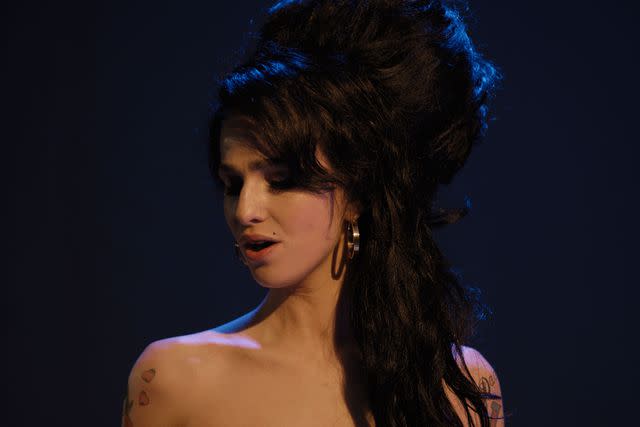Amy Winehouse biopic “Back to Black” is exploitative and tone-deaf
This movie needs to go to rehab...
There are few things as tried and true in cinema as the tragic tale of the price of fame (see: four versions of A Star Is Born). It’s a story we watch play out on screens and in real-time again and again — and Back to Black, the new biopic about soulful singer Amy Winehouse, is the latest addition.
But the movie, which hits theaters May 17, has the fatal flaw of being far more invested in Winehouse’s demons than in her talent. Winehouse, played by Marisa Abela, is never a woman with depth or dimension but rather a series of stereotypes: a (relative) good girl with big dreams, an entitled talent with a vision no one understands, a manic pixie dream girl who falls headlong into love and addiction, and a cautionary tale.
“I want to be remembered for just being me,” Winehouse says, reading from an art school application essay at the beginning and end of the film. But this take on Winehouse by director Sam Taylor-Johnson (Fifty Shades of Grey) tells us nothing of who she is beyond the tabloid narratives and salacious tales we already know. By the time we arrive at the introduction of Winehouse’s famous beehive, shot from behind and in close-up to emphasize its importance, it’s a challenge not to roll one's eyes.

Courtesy of Dean Rogers/Focus Features
Marisa Abela in. 'Back to Black'Related: Amy Winehouse through the years
Screenwriter Matt Greenhalgh (Nowhere Boy) takes the unwise approach of tracking Winehouse’s life from the ages of 17 to 27, beginning shortly before she lands her first record deal and continuing through her death in 2011. Biopics often struggle when they take this sweeping, life-story approach, and that’s certainly the case here, as Winehouse’s story churns onward with no context as to where or when we are in her life. How much time is there between Winehouse’s first album and her breakout sophomore hit, Back to Black? Did her first relationship with Blake Fielder-Civil last longer than one night (or was one night all it took to spawn a hit album and send Winehouse into a spiraling drug addiction)?
Sure, drama must be condensed to tell a story in approximately two hours, but our only clue that time is passing comes via Winehouse’s growing beehive. Without conveying how much time and effort Winehouse invests in her relationships and career, it’s difficult to understand the emotional impetus of her choices. Or to even care about them as they come.
Abela gives it her all, amply helped by the wardrobe and hair and makeup departments. But there’s something about her that doesn’t quite ring true. Winehouse’s drug binges and drunken stupors, which make up the majority of the film, feel blatantly acted — the kind of telegraphed performance choices you might expect to see in a school production rather than a major motion picture.
When Abela gives a more stripped-down version of Winehouse, there’s glimmers of emotional truth. Of course, the trussed-up Winehouse is and always was an act, but Abela doesn’t nail that sense of transition — there’s no understanding of the moment when the predilection for vintage styles and larger-than-life hair takes over her sense of self to an unhealthy degree. No unpacking of how Winehouse became more caricature than human to the vultures who preyed on her struggles.

Courtesy of Dean Rogers/Focus Features
Marisa Abela and Jack O'Connell in 'Back to Black'Related: 'Back to Black' movie reveals Industry star's transformation into Amy Winehouse
Then, there are the singing and performance sequences. Like many musical biopics nowadays, Back to Black uses a combination of Abela’s vocal performances and Winehouse’s original vocals, often merged on the same track. That distinctive, powerhouse voice coming from an actress who clearly is not producing that level of sound is jarring.
For the most part, Abela is hampered by the film’s dismal script and direction, so it should be no knock on her own skill set, particularly so early in her career. However, she is surrounded by a wealth of stronger performances — Jack O’Connell as Blake, Eddie Marsan as doting father Mitch, and Lesley Manville as Winehouse’s beloved grandmother, Cynthia. O’Connell gives Blake a boxer’s grace, making him a pugilistic hangdog. Greenhalgh’s script sadly offers Blake a more measured and thoughtful rendering than Winehouse, so much so that Blake's acts of violence and brushes with the law are discordant with the person he is presented as.
Want more movie news? Sign up for Entertainment Weekly's free newsletter to get the latest trailers, celebrity interviews, film reviews, and more.
Many close to Winehouse were involved with the project, so it’s no surprise that the film’s best performances come from the two family members who meant the most to her. Despite his fireplug stature, Marsan is helplessly febrile, a man who dotes on his daughter too much to give her the tough love she desperately needs. In his hands, we see how Mitch is both a bodyguard and an enabler. Meanwhile, Manville is the high point of the film as Cynthia, Winehouse’s grandmother and a stylish jazz singer in her own right. Manville brings with her a necessary gravitas and elegance so impactful that with one glance, it’s clear why Cynthia is Amy’s guiding light.
But when Cynthia dies, so does the film, spiraling into the darkest periods of Winehouse’s life and wallowing in them with an exploitative glee. There’s no desire to understand Winehouse’s demons so much as there is to project them in graphic detail for our entertainment.

Worst of all is the film’s persistent emphasis on Winehouse’s desire for motherhood and its role in her tragic end. Whether the plot point is true or not, the way the film shapes it is maudlin and offensive. The camera lingers on Amy as she wistfully stares at mothers and their children, her eye landing on every baby that comes within a 50-foot radius.
Rather than spending any significant time in the recording studio or helping us understand Amy’s creative process, Back to Black dedicates chunks of screen time to the supposition that Winehouse’s inability to have a child was a driving factor in her self-destructive behavior. It’s reductive, perhaps even dangerous, to diminish a woman’s talents and chalk up her demons to a tired, misogynistic trope.
Related: Bond producer remembers 'very sad' meeting with Amy Winehouse about recording 007 song
Winehouse was an estimable artist, one whose passion for Motown, doo-wop, and jazz propelled her to create a singular sound with her remarkable vocal instrument. She channeled her struggles with love and addiction into her music, but the vast majority of that is left for us to infer. There’s no desire to interrogate her artistry or to grant a portrait of what made her tick. In this rendering, Winehouse is made up purely of audacity, vocal theatrics, and addiction-fueled behavior. When it comes to this surface-level exploitation of Amy Winehouse’s life, just say no, no, no. Grade: D+
Read the original article on Entertainment Weekly.

 Yahoo News
Yahoo News 
